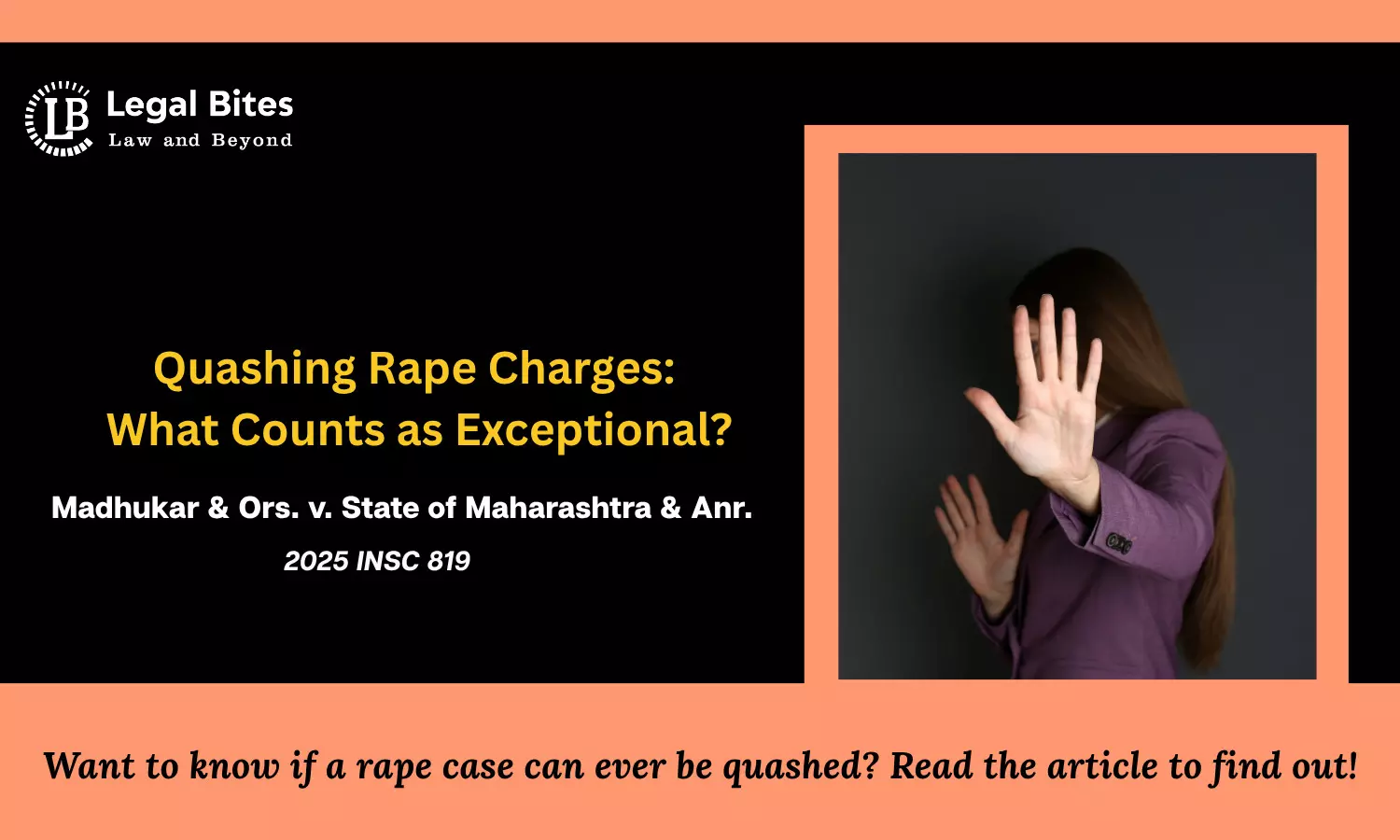Can Exceptional Circumstances Justify Quashing a Rape Case?
Quashing a rape case may be justified in rare, exceptional cases if proceedings are futile or unjust and the complainant’s stand is clear and voluntary.

The Indian criminal justice system regards offences such as rape as grave and non-compoundable, meaning that parties cannot settle these matters privately to escape the rigours of criminal prosecution. Section 376 of the Indian Penal Code (Section 64 of Bharatiya Nyaya Sanhita), which deals with rape, reflects the seriousness with which society and the law treat crimes against women. Yet, the inherent power of the High Courts and the Supreme Court under Section 482 of the Code of Criminal Procedure, 1973 (CrPC) and Article 142 of the Constitution, respectively, allows for the quashing of criminal proceedings to secure the ends of justice.
This article explores the jurisprudential basis, legal provisions, and landmark judgments concerning whether exceptional circumstances can justify quashing a rape case, with special focus on the recent Supreme Court judgment in Madhukar & Ors. v. State of Maharashtra & Anr. (2025 INSC 819).
Statutory Framework: Section 482 CrPC (Now, Section 528 BNSS)
Section 482 of the CrPC (Section 528 BNSS) preserves the inherent powers of the High Court to make such orders as may be necessary to:
- Give effect to any order under the Code,
- Prevent abuse of the process of any court, or
- Otherwise, secure the ends of justice.
This provision is often invoked in cases where the continuance of criminal proceedings would amount to an abuse of process or would not serve any meaningful purpose, especially in light of subsequent developments such as settlements or changes in the status of the parties.
Rape Cases and Compounding of Offences
Rape is classified as a non-compoundable offence under Indian law. Section 320 of the CrPC (Section 359 BNSS), which specifies the offences that may be compounded (i.e., settled by the parties), does not include rape. This is rooted in public policy: crimes such as rape are viewed as offences not just against the individual but against society at large.
Supreme Court Precedent: In Gian Singh v. State of Punjab (2012) 10 SCC 303, the Supreme Court held that heinous and serious offences like murder, rape, and dacoity cannot be quashed on the ground of compromise between the parties. However, the Court also recognised a narrow exception, stating that the power under Section 482 CrPC is not limited by the mere fact that the offence is non-compoundable, but should be exercised sparingly and only in exceptional circumstances to prevent abuse of process or to secure the ends of justice.
Madhukar & Ors. v. State of Maharashtra & Anr.: Facts in Brief
The case of Madhukar & Ors. v. State of Maharashtra & Anr. provides a timely lens through which to examine the doctrine in action.
Factual Matrix
First FIR: On 20.11.2023, an FIR (Crime No. 302/2023) was lodged against the appellants alleging offences including assault (Sections 324, 141, 143, 147, 149, 452, 323, 504, 506 IPC).
Second FIR: The next day, another FIR (Crime No. 304/2023) was registered against Prabhakar (one of the accused) under Section 376 (rape), 354-A, 354-D, 509, and 506 IPC, alleging sexual exploitation and criminal intimidation of the complainant.
Subsequent Development: In March 2024, the complainant in the rape case filed an affidavit expressing her desire not to pursue the prosecution. She cited an amicable settlement, marriage, and the receipt of Rs. 5 lakh towards marriage expenses.
High Court Order: The Bombay High Court rejected applications seeking quashing of both FIRs, holding that offences like rape, being serious and non-compoundable, could not be quashed merely due to settlement or monetary compensation.
Supreme Court’s Intervention: On appeal, the Supreme Court examined whether, under exceptional circumstances, it was justifiable to quash the proceedings in a rape case.
Judicial Analysis: Power to Quash in “Exceptional Circumstances”
Supreme Court's Reasoning
The Supreme Court, while acknowledging the seriousness of rape as an offence, noted several key factors in its decision:
- Sequence and Context: The second FIR (rape) was filed immediately after the first FIR (assault and related offences) by the opposing side, indicating that the rape allegation could be reactionary.
- Complainant’s Unambiguous Stand: The complainant repeatedly expressed—through an affidavit and her conduct—her desire not to pursue the case. She was now married and stated that the continuation of the prosecution would disrupt her life and peace.
- Mutual Settlement: Both parties had amicably resolved their differences, and the complainant had received compensation for marriage-related expenses.
- Public Interest and Ends of Justice: The Court held that, in such peculiar facts and circumstances, continuing the proceedings would not serve any meaningful purpose but rather cause undue hardship to all parties, especially the complainant. The judicial process should not be used to prolong distress, particularly when the complainant herself opposes the prosecution.
Key Highlights of the Decision
“In these circumstances, the continuation of the trial would not serve any meaningful purpose. It would only prolong distress for all concerned, especially the complainant, and burden the Courts without the likelihood of a productive outcome… the continuation of the criminal proceedings would serve no useful purpose and would only amount to abuse of process.”
The Supreme Court, thus, set aside the High Court’s order and quashed both FIRs and all proceedings arising therefrom.
When Can a Rape Case Be Quashed? Guidelines from Precedent
General Principle
Ordinarily, quashing of rape cases on grounds of compromise is not allowed. However, exceptional circumstances may justify such a course, provided the following factors are satisfied:
- The complainant is an adult, acting of her own free will, and not under pressure or threat.
- The continuance of proceedings would not serve the ends of justice and may amount to abuse of process.
- The settlement is not merely a result of monetary compensation but an informed and considered decision of the complainant.
- The case presents peculiar facts where prosecution would cause more harm than good, especially to the alleged victim.
Relevant Supreme Court Judgments
1. Gian Singh v. State of Punjab (2012)
Recognised limited scope for quashing in non-compoundable offences in exceptional cases to secure the ends of justice, but emphasised that this should be exercised with great caution, particularly in cases of serious offences.
2. Narinder Singh v. State of Punjab (2014) 6 SCC 466
Laid down guidelines on quashing criminal cases involving non-compoundable offences, stating that heinous and serious offences, especially those involving moral turpitude like rape, should generally not be quashed based on settlement.
3. State of Madhya Pradesh v. Laxmi Narayan (2019) 5 SCC 688
Reiterated that the inherent powers under Section 482 CrPC should be exercised sparingly and that heinous crimes should not ordinarily be quashed on the basis of compromise.
Balancing Victim’s Autonomy and Public Interest
A key tension in these cases is the balancing of two important objectives:
- Victim’s Autonomy and Dignity: The law must respect the complainant’s autonomy, especially where she clearly wishes not to pursue prosecution for personal reasons (e.g., subsequent marriage, desire to move on, avoidance of further trauma).
- Public Interest: Rape is seen as a crime against society, not merely the individual. Quashing such cases lightly may send a wrong message and undermine the deterrent effect of criminal law.
The Supreme Court, in its latest pronouncement, has clarified that the “ends of justice” are the guiding touchstone, and not every settlement or withdrawal by the victim will justify quashing. The facts must demonstrate genuine and exceptional circumstances, with the complainant’s wishes being neither tentative nor coerced.
Potential Risks and Concerns
While the judgment in Madhukar & Ors. offers a humane and pragmatic approach, but there are valid concerns:
- Risk of Misuse: There is always a risk that a powerful accused may coerce or induce the complainant into a settlement, especially in cases involving social or economic disparities.
- Precedential Value: Routine acceptance of settlements in rape cases could dilute the gravity of the offence and undermine the policy intent of making such crimes non-compoundable.
- Judicial Discretion: The test of “exceptional circumstances” is subjective, and much depends on the facts as well as the approach of individual judges.
Implications of the Ruling
The Supreme Court’s decision is not a blanket license for quashing rape cases on settlement. Instead, it serves as a precedent for courts to:
- Scrutinise the genuineness and voluntariness of the complainant’s desire to withdraw.
- Assess the factual context for any indications of coercion, inducement, or abuse of process.
- Ensure that public interest and societal values are not sacrificed at the altar of expediency.
- Balance the objective of preventing further trauma to the complainant with the need to uphold the sanctity of criminal law.
Conclusion
The question—Can exceptional circumstances justify quashing a rape case?—cannot be answered with a simple yes or no. The Supreme Court, in Madhukar & Ors. v. State of Maharashtra (2025), has held that in rare, exceptional situations where continuation of proceedings would be futile, unjust, or an abuse of process—and where the complainant’s stand is unequivocal and voluntary—quashing may be justified to secure the ends of justice.
However, such power must be exercised sparingly, with caution, and only after careful judicial scrutiny of the facts and circumstances. The guiding principle is not convenience, but justice—one that respects the complainant’s autonomy without undermining public interest.
Ultimately, the ruling reaffirms that law is not a blunt instrument, but a tool for achieving substantive justice, responsive to both the realities of human relationships and the demands of social order.

